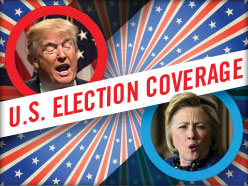
Americans may be more focused on jobs and national security, but, with Wells Fargo making headlines for fraudulent customer accounts, regulatory reform is again in the spotlight.
Michael Busler, a professor of finance at Stockton University in New Jersey, says former presidents J.F.K., Ronald Reagan and Bill Clinton all reduced burdensome regulation (and cut taxes) to help grow the economy.
Read: Loonie expected to decline on U.S. election, no matter the winner
Regulatory reform: up in smoke or piled high
Donald Trump is also on board for deregulation, though like with other policy pledges, he offers few details. He simply proposes dismantling or repealing unnecessary regulation. By comparison, Clinton’s litany of regulatory reforms and enhancements to the Dodd-Frank Act is longer than Santa’s naughty list.
“It’s hard […] to imagine she would be [proposing] any of this [regulatory reform] if she hadn’t run against such a dogged primary challenger from the far left, in Bernie Sanders,” says Gordon Gray, fiscal policy director at the American Action Forum in Washington. “What you end up with are cheap slogans.”
Adds Busler: “Dodd-Frank made it difficult for banks to lend to anyone, [so] lending went down significantly. When that happens, the effect of monetary policy [in the form of quantitative easing] is minimized.” Strengthening Dodd-Frank will continue that trend and slow the economy, he says.
But it’s now harder for Trump to make his deregulation argument, says John Hudak, deputy director at the Brookings Institution in Washington. “Not because of the basis of the policy, but because of the realities of the political conversation right now around Wells Fargo,” he says.
Gray is skeptical of Clinton’s proposed high-frequency trading tax and suggests she’s capitalizing on the media’s fraud focus. Increased taxation often serves to move the activity in question underground, he says. And increased costs for financial institutions ultimately trickle down to consumers, Hudak says.
Where there’s smoke
Although unmentioned by either candidate, one area in need of banking deregulation is marijuana sales, Hudak adds.
Marijuana is a Schedule 1 drug under the Controlled Substances Act, meaning that it has no accepted medical use according to the U.S. Drug Enforcement Administration, he says. “Businesses that operate legally under state systems are not able to access basic financial products like chequing accounts and savings accounts, business loans, lines of credit,” Hudak says.
Read: Cannabis industry gets equity crowdfunding portal
But California is expected to legalize recreational marijuana in November, quickly doubling the United States’ multibillion-dollar industry and necessitating banking deregulation. That would be an important development for associated secondary and tertiary industries, like real estate, Hudak says.
“This is going to […] be a fairly non-trivial issue for both the next American president and for the Trudeau government,” he predicts.
Smoke and mirrors
Neither candidate may be rushing to support the marijuana business, but what they do support is revealing.
Trump’s rhetoric on building a wall on the Mexican border reveals a worldview in which there is no international flow of money, commerce, information, ideas or people — and “all of those things are so important for the international economy right now,” says Hudak.
Trump proposes a rule that no aliens be allowed to wire money outside the U.S. before providing documentation of their lawful U.S. presence. The sanction would be a temporary measure intended to starve Mexico of most of the US$24 billion that Mexican nationals wire home each year, and compel the Mexican government to cough up money for the wall. The controversial rule would presumably apply to Canadians and all other non-U.S. citizens.
Read: Crossing the border could be harder under Trump
It’s not a serious proposal, says Gray; besides that, it’s impractical. He asks dubiously: Would Americans approve of their government seizing property in the form of financial transactions? And how would these people be identified—by the cultural background associated with their last names?
“There are illegal payments that [the U.S.] intercepts,” says Gray, “but we have deliberate ways of doing that, and this [proposed rule] does not […] comport with that framework.”
The wall rhetoric should “terrify international investors, because […] what’s next?” asks Hudak. “An electronic wall between traders in New York and traders in London or Toronto? […] It’s hard to build a wall between the U.S. and Mexico; it’s a lot easier to close other commercial avenues off between the U.S. and the rest of the world.”